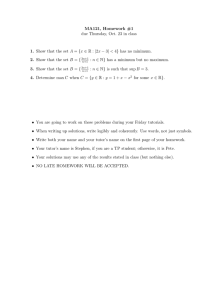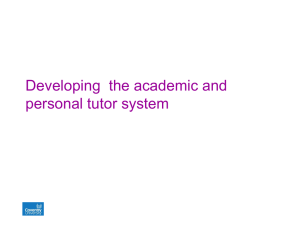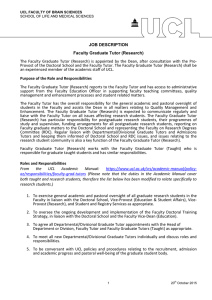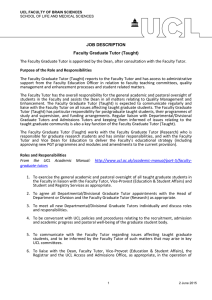History MPhil/PhD Application Advice
advertisement
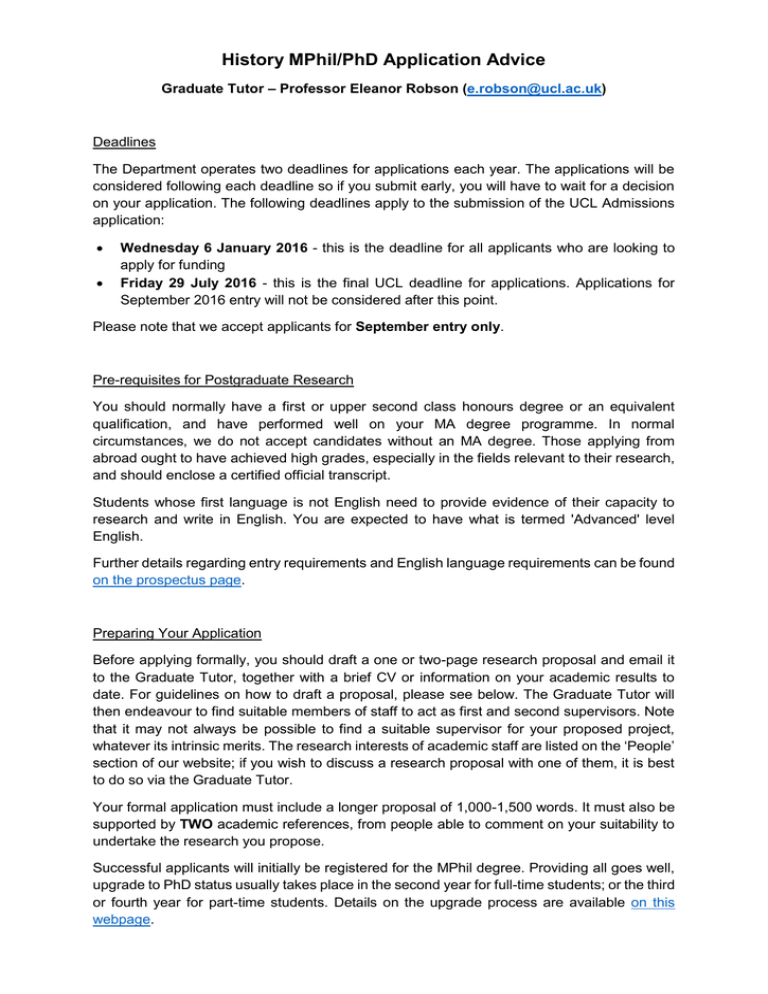
History MPhil/PhD Application Advice Graduate Tutor – Professor Eleanor Robson (e.robson@ucl.ac.uk) Deadlines The Department operates two deadlines for applications each year. The applications will be considered following each deadline so if you submit early, you will have to wait for a decision on your application. The following deadlines apply to the submission of the UCL Admissions application: Wednesday 6 January 2016 - this is the deadline for all applicants who are looking to apply for funding Friday 29 July 2016 - this is the final UCL deadline for applications. Applications for September 2016 entry will not be considered after this point. Please note that we accept applicants for September entry only. Pre-requisites for Postgraduate Research You should normally have a first or upper second class honours degree or an equivalent qualification, and have performed well on your MA degree programme. In normal circumstances, we do not accept candidates without an MA degree. Those applying from abroad ought to have achieved high grades, especially in the fields relevant to their research, and should enclose a certified official transcript. Students whose first language is not English need to provide evidence of their capacity to research and write in English. You are expected to have what is termed 'Advanced' level English. Further details regarding entry requirements and English language requirements can be found on the prospectus page. Preparing Your Application Before applying formally, you should draft a one or two-page research proposal and email it to the Graduate Tutor, together with a brief CV or information on your academic results to date. For guidelines on how to draft a proposal, please see below. The Graduate Tutor will then endeavour to find suitable members of staff to act as first and second supervisors. Note that it may not always be possible to find a suitable supervisor for your proposed project, whatever its intrinsic merits. The research interests of academic staff are listed on the ‘People’ section of our website; if you wish to discuss a research proposal with one of them, it is best to do so via the Graduate Tutor. Your formal application must include a longer proposal of 1,000-1,500 words. It must also be supported by TWO academic references, from people able to comment on your suitability to undertake the research you propose. Successful applicants will initially be registered for the MPhil degree. Providing all goes well, upgrade to PhD status usually takes place in the second year for full-time students; or the third or fourth year for part-time students. Details on the upgrade process are available on this webpage. Writing Your Research Proposal The quality of your research proposal is essential to a successful application, for being admitted to the department of your choice and, especially, if you wish to be considered for funding. In most cases your proposal will go through several drafts and you should discuss it with your academic advisors at your home institution, the Graduate Tutor at the institution to which you apply or the potential supervisor. Please do not contact potential supervisors or the Graduate Tutor without having a relatively clear idea in mind of what you wish to do. Make sure that the department offers expertise in your chosen field of research. You can find staff profiles on the ‘People’ pages of our website, indicating fields of research and areas of supervision. If in doubt, contact the Graduate Tutor. When preparing the first draft of your proposal you need to identify a field of research, think about possible primary sources, case studies and consider the project’s chronological and geographical scope. Make yourself familiar with the existing historiography in the field and try to identify gaps in research that your project might be able to close. Do not be over ambitious and keep in mind that any PhD project has to be completed in three to four years of full-time study (or six to seven years of part-time study). You need to think about possible theoretical approaches to your topic and consider different methodologies appropriate for the analysis of your sources. On this basis, you should formulate a set of research questions and identify the problems your thesis might be able to solve. We advise that you address the following issues when drafting your proposal: Think about a working title, which is sufficiently descriptive to make sense also to historians who are not necessarily specialists in your field. What are your project’s objectives? It is not sufficient that a topic “is interesting”. Why is it interesting and why does the project matter? How will your research relate and contribute to existing historiographical debates? What will be your primary sources? Where are they located and are they accessible? Will you need to spend time abroad? Is there an interdisciplinary dimension to your project and how are you able to deal with this? On what basis do you consider yourself qualified to undertake the project? Have you worked in the field for your undergraduate or MA dissertation? Do you have the necessary research skills and are there any additional skills which you need to develop as part of your training (languages, palaeography, quantitative or qualitative methods of research)? Your initial proposal should be 300-500 words long. This will allow us to see if it is possible to supervise your project within the History Department. Send a draft to the department’s Graduate Tutor who will then forward it to a potential supervisor. If you have a specific supervisor in mind, please mention this. When you formally apply please supply a longer proposal of roughly 1,000-1,500 words.



